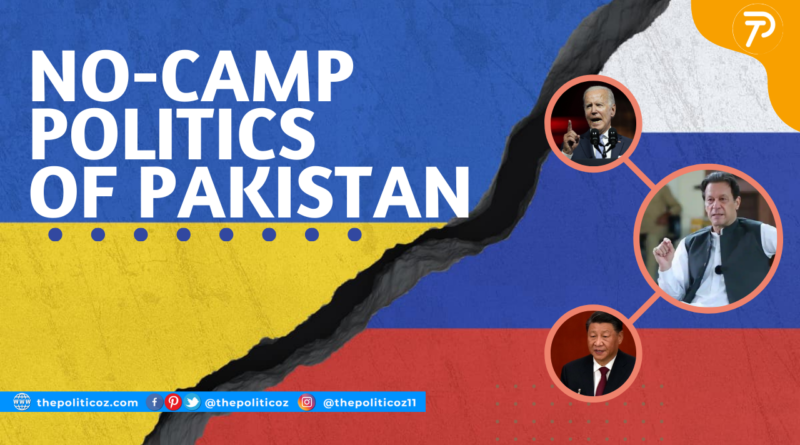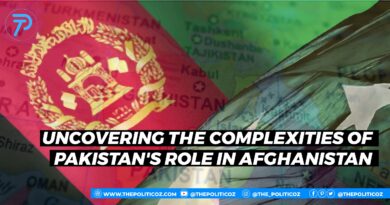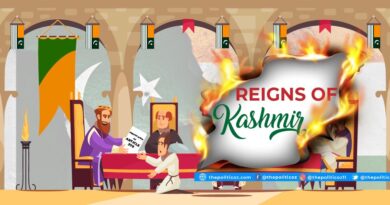No-Camp Politics of Pakistan
No-Camp politics of Pakistan
There have been a lot of highs and lows in the U.S.-Pakistan relationship. Pakistan’s current goal of preserving good relations with all major world powers is based mainly on its Cold War experience, in which joining the U.S. camp caused it to become estranged from the USSR and now plans for no-camp politics.
The cooperation was also not perceived as providing Pakistan with the amount of Western assistance it wanted for its nuclear development and battles with India. Pakistan has also expressed dissatisfaction over not receiving enough credit for its role in the War on Terror and for being left alone in the aftermath of the Soviet-Afghan War while providing the United States full assistance in its proxy war in Afghanistan.
Still, for Pakistan, the experience ultimately represents the mistake of putting all eggs in the Western basket. The nation wants to proceed with greater caution to achieve a more balanced foreign policy.
Potential Effects of the Ukraine War on Pakistan’s Trade
In February 2022, Russia began a full-scale military invasion of Ukraine, making it abundantly apparent to the rest of the world that it opposes further NATO expansion in its direction and opposes Ukraine’s plans to join NATO. The war is killing a terrible number of people and will probably have an ongoing impact on world trade, notably the energy markets. Pakistan, which already experiences high inflation, slow economic growth, and political instability, would not fare well from this.
Pakistan has historically maintained strategic partnerships with both Russia and Ukraine. Islamabad supported the United States throughout the Cold War. It was crucial in helping the 1980s Afghan opposition to the Soviet occupation of the neighbouring country during that decade with weapons and training.
Russia’s exports to Pakistan have climbed at an annual rate of 10.2% during the past 24 years, while Pakistan’s exports to Russia have increased at an annualised rate of 13.6% over the same period, from USD 13.1M in 1996 to USD 279M in 2020.
The exports from Pakistan to Ukraine, on the other hand, climbed at an annualised rate of 15.5% during the past 24 years, from USD 18.1M in 1996 to USD 573M in 2020, while the exports from Ukraine to Pakistan increased at an annualised rate of 14.8%, from USD 2.98M to USD 82.1M in 2020.
Pakistan’s commerce with Russia in 2021 was worth USD 711M, including USD 537M in imports from Russia. The trade value with Ukraine was 800 million dollars, including 739 million dollars in imports. Pakistan and Ukraine have cordial, though small, commercial relations, with wheat production playing a considerable role.
In recent years, Pakistan and Russia have decided to advance their bilateral cooperation in all spheres, including trade, defence, the economy, and energy. However, the conflict can disrupt Pakistan’s new strategic geopolitical pivot which compels the policy makers for no-camp politics this time.
Sanctions against people affiliated with the Russian regime have been imposed or strengthened by the United States, the European Union, and other nations. In response to the restrictions, Russia has prohibited the shipment of several goods and issued a warning that it may cut off the gas supply in retaliation to the penalties on oil.
To be more explicit, The U.K. will phase out Russian crude by the end of this year, while the United States has banned importing Russian natural gas and oil. Furthermore, the European Union, which imports 25% of its gas and 45% of its oil from Russia, plans to move to other energy sources in the next ten years to become energy independent. Germany has halted the start of the Nord Stream 2 gas pipeline from Russia.
This disruption of energy supplies from the world’s largest supplier Russia is resulting in a hike in energy prices worldwide. This is a significant setback for an oil-importing country like Pakistan because oil accounts for a sizable share of its imports. This has the potential to deplete our national reserves, thereby shrinking the country’s purchasing power even more.
The conflict will directly impact Pakistan’s wheat imports from Ukraine, which accounted for 39% of the total imported wheat in the preceding fiscal year. The potential snowball effect of this conflict is massive, with a surge in electricity rates, rising interest rates by central banks, wage-increase demand to meet increased living costs, increased prices by businesses to compensate for higher wages, and workforce cuts leading to unemployment.
No Camp Politics Approach
The South Asian nuclear-armed Muslim country has resisted Western pressure to condemn Moscow for its invasion of Ukraine, instead advocating dialogue and diplomacy to end the crisis. Pakistan has argued that it needs to step back from global bloc politics and will remain in no-camp politics to improve ties with all countries, including Russia, and to tackle its domestic economic challenges.
Khan has defended his trip to Moscow, the first by a Pakistani prime minister in 23 years, saying his country’s economic interests required him to do so. The decision by Pakistan to continue the prime minister’s visit was wise, given that we have been working hard for years to foster trust and ease in our relations with Moscow.
“We do not want to be part of any camp. We have paid the price for being in camps. That is why we are very carefully treading. We don’t want to compromise our neutrality, and that’s why we abstained,” Qureshi told VOA.
Similar to how our decision to abstain made sense in light of the Security Council vote from China and India. Pakistan, a significant non-NATO partner of the United States, did not cast a ballot. Moreover, 34 additional countries did, including Bangladesh, Sri Lanka, and India. Pakistan has been relatively pragmatic in its decisions when a situation involves significant powers.
When a problem involves significant power, Pakistan has acted with a fair amount of pragmatism. As the leading nation negotiating a Security Council resolution on the Soviet military operation in Afghanistan in January 1980, we were able to avoid explicitly mentioning the Soviet Union. We demanded the departure of “foreign forces.” Our public condemnation of the 2003 American invasion of Iraq or the American involvement in Syria and Libya was reserved.
Demarche by European Union Ambassadors
Principles are essential, but nations weigh their core interests when deciding in fraught and critical situations. Although the E.U. ambassadors’ approach was reasonable, they went too far when they approached the Foreign Office publicly.
In New Delhi, there was no similar activity and are smoothly following no-camp politics. Given their opposition to Pakistan’s interests in the FATF and Nuclear Suppliers Group, as well as their near indifference to the plight of Kashmiris and the Muslims who live in India who are subjected to discrimination because of their religion, how could they have higher expectations from Islamabad?
Despite this transgression, which only called for a response from the Foreign Office, we should continue to emphasis our statements supporting Ukraine’s territorial integrity and sovereignty, as well as calling for the avoidance of violence against civilians and the use of diplomacy and a peaceful solution to promote no-camp politics. But dragging this policy onto public platforms for domestic political advantage is inadvisable.
Treading Cautiously to Attain Strategic Interests
The scenario is anything but favourable for Pakistan, which wants to strengthen its relationships with Russia without endangering its relations with Western nations. The administration declared a neutral stance in order to avoid taking sides with any group caught between a rock and a hard place.
However, this “no camp politics” stance does not tackle the Ukraine situation. Russia and the European Union are merely fresh weights in Pakistan’s ongoing effort to strike a balance between its relations with China and the United States.
Suppose Pakistan truly wants to take a neutral stance. In that case, it will require a robust and scaled-up effort to repair its relationship with the Western powers, notwithstanding already tense relations with the United States. To demonstrate a balance of support between superpowers, vocal backing for the West’s position on Ukraine is required.
The neutrality policy aligns with the country’s geopolitical and geoeconomic realities. Pakistan can strengthen its relationships with Moscow without severing ties with Washington as India seeks to maintain a balance in its relations with the U.S. and Russia and as Russia works to achieve a similar balance with India and Pakistan.
As Pakistan faces a security problem due to American support for India’s military and nuclear energy development, which pushes it further toward China and Russia, strengthening ties with Moscow is also strategically important for Islamabad.
Struggling Economy and Western Powers
For Pakistan’s geoeconomic objectives, neither China nor Russia can supersede the United States and the European Union. In addition to being unable to absorb the outflow of Western wealth, Pakistan’s ailing economy is also largely reliant on aid from international financial institutions controlled by these Western nations.
About 20% of all exports from Pakistan go to the U.S., 28% to the E.U., and 8% to the U.K. On the contrary, Russia only takes in about 1% of Pakistan’s exports, and China’s proportion of exports is still below 10%. More significantly, Ukraine’s appeal in terms of economy and security is diminished by Russia’s military operation there. Western sanctions against Russia will further delay the long-awaited Pakistan Stream Gas Pipeline investment. Therefore, Pakistan’s best course of action is maintaining excellent relations with Western nations.
No camp politics or stalemate?
The foreign office did not approach Western governments to regain their lost trust because they misinterpreted no camp politics for a politics of silence and standstill. When Pakistan was requested assistance, the government chose not to reply. In a remarkable gesture, the foreign envoys of 22 nations—mainly from the European Union and Japan—wrote a joint letter urging Pakistan to condemn the Russian aggression and speak out more vigorously to support the fundamentals of international law.
After voicing support for Ukraine’s sovereignty and territorial integrity earlier, Pakistan could have issued a louder condemnation of the Russian invasion that was more in line with the Western position. However, it made the decision not to reply to the letter. Pakistan missed another opportunity to reassure the West of its impartial attitude by choosing to be one of the 35 governments that abstained from voting as the UNGA passed a resolution condemning the Russian invasion of Ukraine with 141 votes.
Pakistan’s challenge is to retain its relationships with China, strengthen its ties with Russia, and avoid alienating the United States. Pakistan must understand that its recent rhetoric and actions are moving it closer to the Sino-Russian camp. It’s time to rebuild its ties with the Western powers by taking a strong stand against Russia’s aggression on Ukraine if it wishes to support no-camp politics.
Syed Nek Muhammad| Former student of BS Political Science




